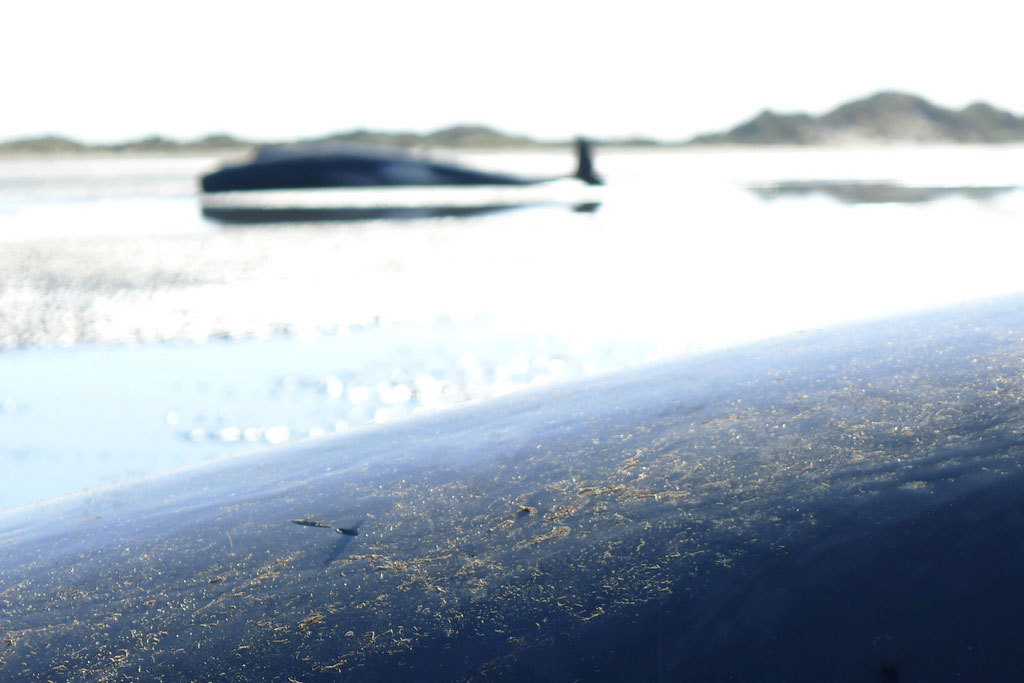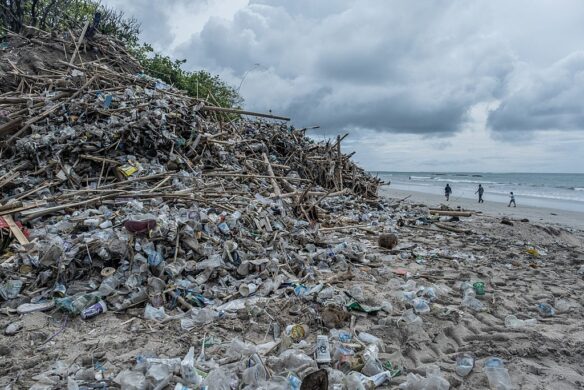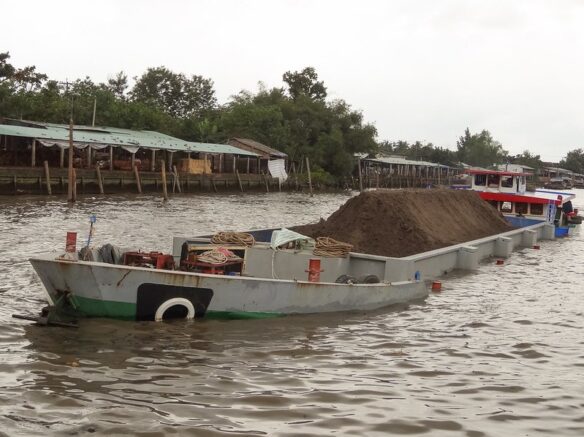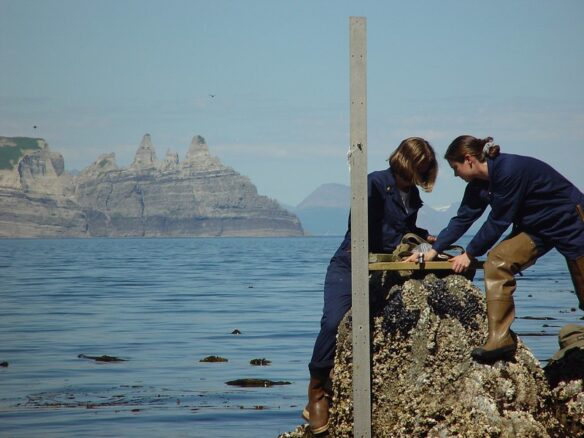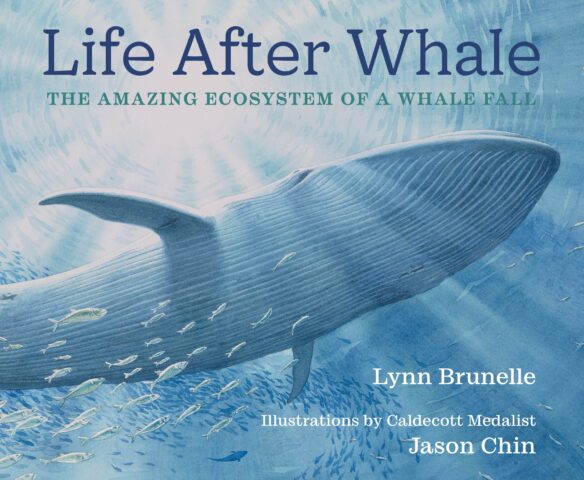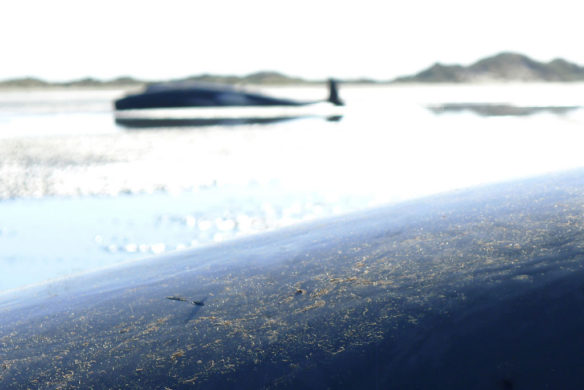
Photo source: ©© Angieandsteeve
“When plastic ingestion occurs, it blocks the digestive tract, gets lodged in animals windpipes cutting airflow causing suffocation, or fills the stomach, resulting in malnutrition, starvation and potentially death.” Caption: © SAF — Coastal Care.
Excerpts;
The carcass of a pregnant sperm whale that washed up in Sardinia, Italy, last week had 22 kilograms (49 pounds) of plastic in its stomach, and was carrying a dead fetus, the country’s environment minister and a marine life non-profit organization said…
Read Full Article; CNN (04-01-2019)
Dead whale found with 40 kilograms of plastic bags in its stomach; CNN (03-18-2019)
A young whale whose carcass washed up in the Philippines died of “dehydration and starvation” after consuming 40 kilograms (88 pounds) of plastic bags, scientists have found….
Whale found In Thailand dies from eating over 80 plastic bags; Huffington Green (06-03-2018)
Whale found dying off coast of Norway with 30 plastic bags in its stomach; Telegraph UK (02-03-2017)
Kenya: Marine debris threaten to suffocate sea animals; The Star Kenya (01-24-2017)
Marine researchers spotted a dolphin suffocating in a plastic bag last week in Watamu, Kenya. The incident, the first to be witnessed there, has raised concern on the safety of the millions of sea animals in the Indian Ocean waters due to the increased cases of plastic waste.
Plastics found in stomachs of deepest sea creatures; Guardian UK (11-15-2017)
The study, led by academics at Newcastle University, found animals from trenches across the Pacific Ocean were contaminated with fibres that probably originated from plastic bottles, packaging and synthetic clothes…
The Plastic Found In a Single Turtle’s Stomach, Independent UK (03-24-2011)
90 Percent of Seabirds Have Plastic in Their Stomachs, Newsweek (09-01-2015)
By 2050, nearly all seabirds will have plastic in their stomachs. Already, 9 out of 10 of the birds have some of the substance in their digestive tracts. Such are the sobering conclusions of a study published August 31 in the journal Proceedings of the National Academy of Sciences…
Great Barrier Reef Corals Eat Plastic; Science Daily (02-27-2015)
Researchers in Australia have found that corals commonly found on the Great Barrier Reef will eat micro-plastic pollution. Microplastics are tiny fragments of plastic in the environment and are a widespread contaminant in marine ecosystems, particularly in inshore coral reefs…
Taste, not appearance, drives corals to eat plastics; Duke University (10-24-2017)
New UN report finds marine debris harming more than 800 species, costing countries millions; United Nations (12-05-2016)
Marine debris is negatively affecting more than 800 animal species and causing serious losses to many countries’ economies, according to a United Nations report launched December 5th, 2016…
Whale and shark species at increasing risk from microplastic pollution – study; Guardian UK (02-05-2018)
Whales, some sharks and other marine species such as rays are increasingly at risk from microplastics in the oceans, a new study published in the journal Trends in Ecology and Evolution, suggests…
Video captures moment plastic enters food chain, BBC News (03-11-2017)
A scientist has filmed the moment plastic microfibre is ingested by plankton, illustrating how the material is affecting life beneath the waves. The footage shows one way that plastic waste could be entering the marine and global food chain…
Brain damage in fish from plastic nanoparticles in water, Science Daily (09-25-2017)
A new study shows that plastic particles in water may end up inside fish brains. The plastic can cause brain damage, which is the likely cause of behavioral disorders observed in the fish…
How microplastics, marine aggregates and marine animals are connected; Science Daily (10-23-2018)
New UN report finds marine debris harming more than 800 species, costing countries millions; United Nations (12-05-2016)
Marine debris is negatively affecting more than 800 animal species and causing serious losses to many countries’ economies, according to a United Nations report launched December 5th, 2016…
Piling up: Drowning in a sea of plastic; CBS News (08-05-2018)
Piece by piece, an environmental threat is piling up, and we’re ALL to blame. Worse yet, even those of us trying to bring an end to the problem may not be doing as much good as we think…
These 10 companies are flooding the planet with throwaway plastic; Greenpeace (10-09-2018)
Nine months, six continents, 239 cleanup events, and more than 187,000 pieces of trash later, we now have the most comprehensive snapshot to date of how corporations are contributing to the global plastic pollution problem…
More Recycling Won’t Solve Plastic Pollution; Scientific American (07-06-2018)
More than 8. 3 billion tons of plastics made: Most has now been discarded; Science Daily (07-19-2017)
Humans have created 8.3 billion metric tons of plastics since large-scale production of the synthetic materials began in the early 1950s, and most of it now resides in landfills or the natural environment, according to a study.
Biodegradable plastic ‘false solution’ for ocean waste problem; Guardian UK (05-23-2016)
Plastic Pollution: When The Mermaids Cry, The Great Plastic Tide, Coastal Care
Washed out on our coasts in obvious and clearly visible form, the plastic pollution spectacle blatantly unveiling on our beaches is only the prelude of the greater story that unfolded further away in the world’s oceans, yet mostly originating from where we stand: the land…

